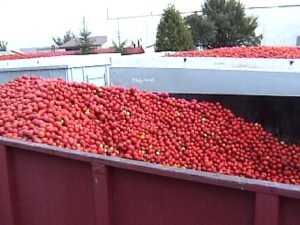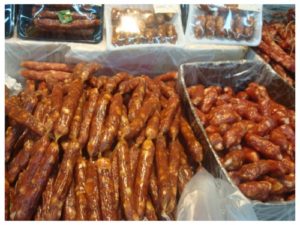Chapman and I toured southern Ontario tomato farms and processors 16 years ago, and shot youtube video, but youtube didn’t exist, so we didn’t know what to do with the video.
Trevor Wilhelm of the Windsor Star reports that bankrupt Maidstone tomato processing company received a controversial $3- million provincial grant is expected to plead guilty next month to purposely mislabelling products as organic.
An order signed by a Toronto judge states that William (Bill) Thomas, owner of Thomas Canning, has agreed to plead guilty on behalf of the company and pay a $40,000 fine. In exchange, several other charges against the company and Thomas himself will be withdrawn.
The judge’s order states the guilty plea must be entered no later than Nov. 23. Thomas’s next scheduled court appearance in Windsor is Nov. 6.
The guilty plea and $40,000 fine is part of a joint submission from prosecution and defence lawyers. But the judge’s order states the court is not bound by that submission.
Thomas Canning and its owner are accused of labelling regular canned tomato products as organic.
 The company and Thomas were also charged with falsifying the country of origin on their products between September 2013 and July 2015, passing off American tomato products as Canadian with labels that read “Product of Canada.”
The company and Thomas were also charged with falsifying the country of origin on their products between September 2013 and July 2015, passing off American tomato products as Canadian with labels that read “Product of Canada.”
Thomas was also charged personally with lying to a federal food inspector on Jan. 8, 2015, about canned tomato paste sold under the brand Tree of Life.
The company’s website, which is no longer accessible, previously stated that Thomas Canning charged a 20 per cent premium for organic products.
Farmers planted additional crops, signing contracts with Thomas Canning to supply tomatoes to the new plant. Those additional tomatoes rotted in the field.
Before the company went into receivership earlier this year, nine farmers were suing Thomas Canning for $2.85 million for reneging on contracts to grow tomatoes in 2016.
The Ontario Ministry of Agriculture, Food and Rural Affairs has said it’s fine with the way Thomas Canning used the money. The ministry said the money was used to create and retain jobs, rebrand its Utopia products and open up markets in Nigeria and China.
After receiving the $3 million, Thomas Canning went bankrupt. That process is still winding its way through court.










